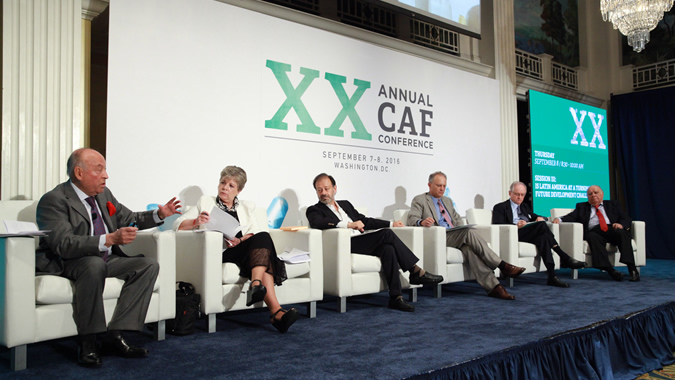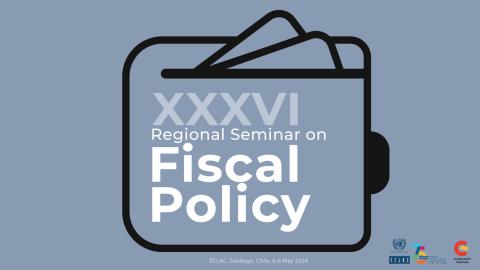Announcement
Latin America and the Caribbean is going through a difficult economic, political and social phase but has the opportunity to change its development trajectory towards more inclusive growth, with more sustainable investment and consumption patterns, Alicia Bárcena, the Executive Secretary of ECLAC, said during the XX Annual Conference of CAF – Development Bank of Latin America.
The senior United Nations official added that the macroeconomic toolbox must be expanded to include fiscal policies that put greater emphasis on tax evasion and avoidance, which in the region represents 6.7% of regional Gross Domestic Product (GDP). In addition, she indicated that the world needs a major impetus based on the coordinated expansion of external demand, which should involve greater financial and monetary stimulus to reactivate economies globally.
“In this context, a big environmental push should also be promoted to ensure technology reaches all levels of the economy and society,” Bárcena said as one of the main speakers on the panel “Is Latin America at a Turning Point? Future Development Challenges,” which was held in Washington in the framework of the CAF meeting.
On that occasion, Bárcena also insisted on the importance of the region joining the processes of technological convergence that are taking place in the world to jump-start production and embracing the challenge of carrying out progressive structural change, with sustainability and equality at the center.
“Latin America and the Caribbean participates actively in the technology of consumption, but not of production. It is imperative that we incorporate ourselves into the fourth industrial revolution that is under way as actors, rather than spectators,” Bárcena indicated at the panel that was moderated by Enrique García, the President of CAF. The other speakers included Enrique V. Iglesias, the former Ibero-American Secretary General; Augusto de la Torre, the World Bank’s Chief Economist for Latin America and the Caribbean; Alejandro Werner, Director of the Western Hemisphere Department at the International Monetary Fund (IMF); and Alejandro Foxley, President and Executive Director of the Corporation for Latin American Studies (CIEPLAN) and a former Chilean Finance Minister.
During her talk, Alicia Bárcena stressed that the region needs to improve its global insertion in light of the big tectonic changes affecting the world, including the rapid emergence of China in the economy and the wave of technological innovation. She recalled that the dominant development pattern is not sustainable and that a paradigm shift based on a big environmental push is needed, manifested in a new industrialization process founded on sustainability that allows us to face “the greatest market failure of all time”: climate change.
She also emphasized the need to address growing inequality in our societies, above all from the perspective of the concentration of wealth. “As we have said in our document Horizons 2030: Equality at the Centre of Sustainable Development, inequality continues to be a critical problem in our region,” ECLAC’s Executive Secretary said.
Bárcena underscored that there is room in Latin America to make progress on issues such as tax evasion. “There have been significant reforms in the region in recent years, especially regarding fiscal matters: 15 countries have already made changes and increased income tax in a progressive way. But there is still room to ensure that the corporate world returns many of the profits it has taken,” she said.
With regard to poverty, the UN official indicated that the region has plateaued and stagnated in its fight against this scourge, which still affects 28% of the population. She added that all the region’s countries have committed to eliminating extreme poverty by 2030, but emphasized that this must be done without losing sight of the fact that it is necessary to grow to be equal, but also to be equal to grow.
In this sense, she highlighted the importance of achieving greater gender equality. “At ECLAC we have insisted on women’s economic autonomy: poverty would fall between 1 and 10 points, depending on the country, if women had the same income and opportunities as men,” she stated.
On the topic of integration, Bárcena said that a new generation of policies is needed. “There are two tasks here: to create a regional digital market to get on board with 4G, and to build coalitions and new compacts with society. To achieve this, the conversation with the private sector must change,” Bárcena said.


